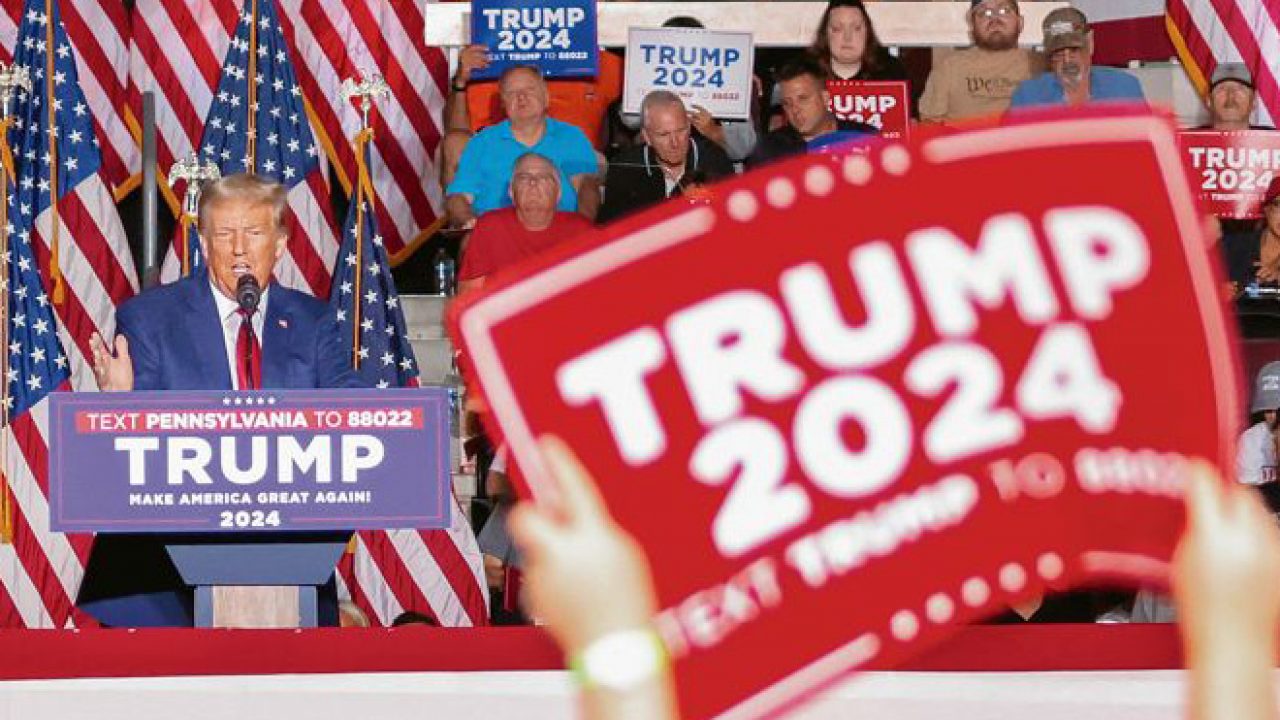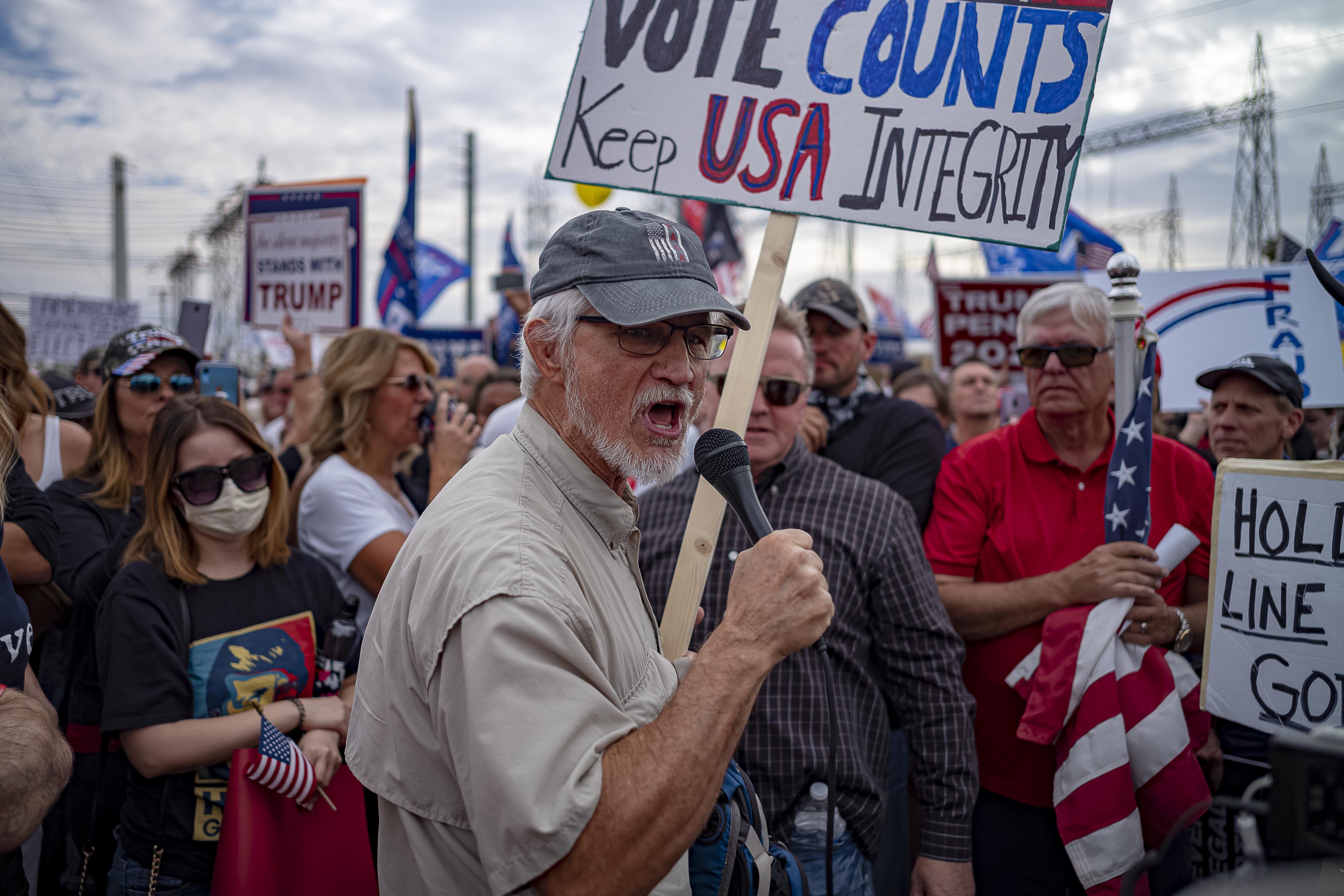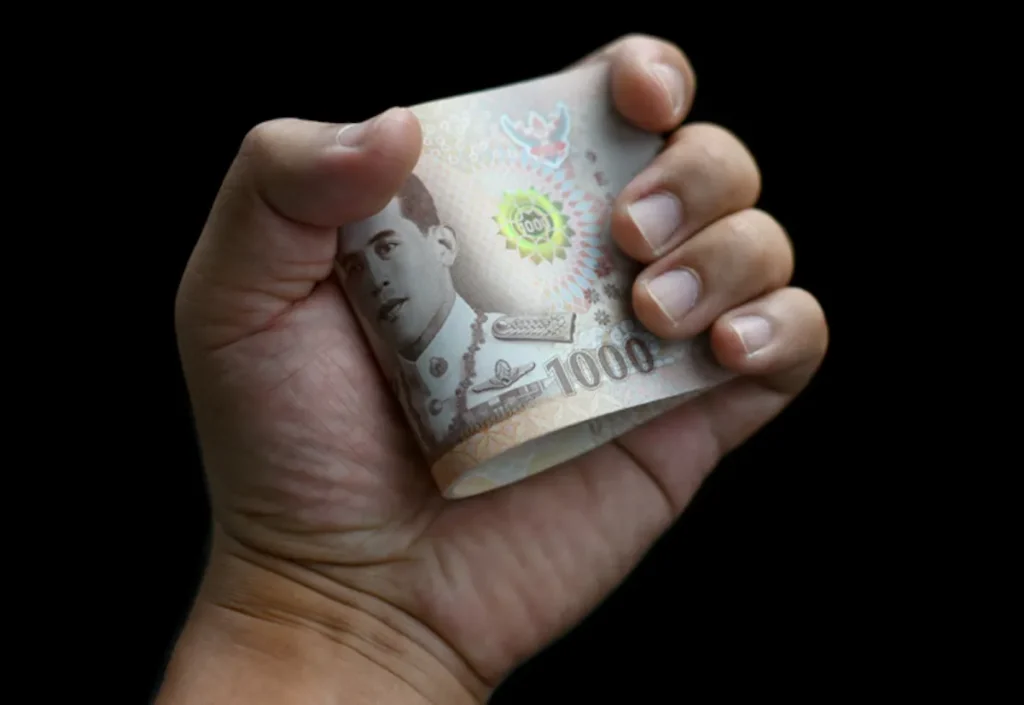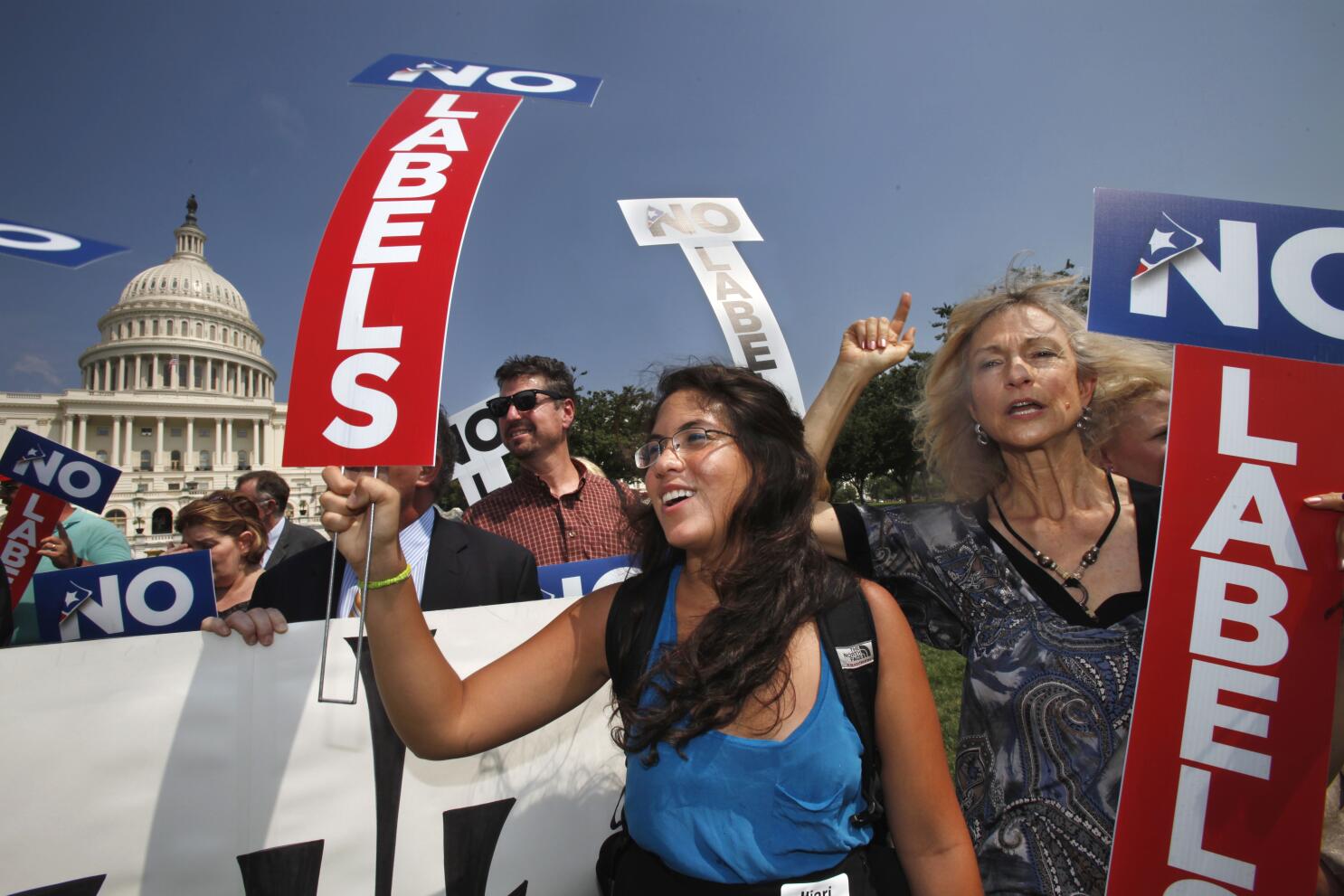Politics
Well-Funded DC Centrist Group Works to Guarantee a Trump Win in 2024

No Labels, a well-funded Washington, D.C.-based centrist organisation, promotes itself as “an organisation of Democrats, Republicans, and independents working to bring American leaders together to solve problems.”
Instead, the organisation appears to seek to build one during next year’s presidential election.
Third Way, a Democratic-aligned nonprofit organisation, charged No Labels on Tuesday with arranging a “radical new plan” to prevent President Joe Biden from gaining an Electoral College majority.
The strategy entails running a well-funded third-party candidate in crucial states before sending the election to the Republican-controlled House of Representatives, where former President Donald Trump would almost certainly win, the New Republic reports.
“No Labels has made it abundantly clear that their new plan is to put a Republican at the top of their ticket,” Third Way stated in a memo published on Tuesday. “And, because they can’t win the presidency outright, they’ve indicated that they intend to use the 270 Electoral College votes to exert leverage over the winner.”

That daring new idea would guarantee Trump a second term.”
Such a result would be disastrous for American democracy. If Biden’s popularity continues to dwindle, Trump may win the 2024 presidential election on his own, which would be perilous in and of itself.
A contingent election in the House of Representatives, on the other hand, would exacerbate the problem by completely bypassing the will of the American public in favour of a two-century-old process that has previously destabilised the country.
In an undated FAQ on its website, No Labels has denied that this is what it seeks to achieve. “No Labels is solely getting ballot access,” it asserted. “That’s all there is to it.
We are not running for president. No Labels will not lend our ballot queue to an independent Unity ticket until it has a realistic prospect of winning the Electoral College outright.” (An “independent Unity ticket” has no prospect of winning the Electoral College outright.)
Third Way, on the other hand, cited more recent statements by No Labels staff as well as some of their published publications. No Labels’ senior strategist, Ryan Clancy, told CNN in May that the organisation may use its electoral votes as a “bargaining chip” with one of the two major-party candidates to avoid a new election.
Because Trump would almost likely win a contingent election and would have little motivation to avoid one, “negotiating” with Biden would be necessary.
In an article published in August on RealClearPolitics, No Labels highlighted a contingent election as one potential avenue to “win” a presidential election, detailing previous occasions where a small faction was able to influence the outcome.
Political scientists argue what would happen in such a contingent election in modern times, but 1824 demonstrates that the path to the Oval Office can be more improbable than voters typically believe,” it ended sarcastically.
Third-party candidates are almost always hopeless in American politics. They lack the public support and political infrastructure to undertake meaningful presidential campaigns.
The most recent successful attempt occurred in 1992, when Texas businessman Ross Perot funded a competitive challenge to Republican incumbent George H.W. Bush and Democratic opponent Bill Clinton. Nonetheless, Perot failed to garner a plurality of votes in any single state, something no third party has done since 1968. Since the 2000 presidential election, third-party candidates have frequently been viewed as spoilers who could influence a close election.
That appears to be the intention of No Labels. The majority of its public-facing publications emphasise its desire for ballot access in all 50 states and the District of Columbia.
Other polling documents, however, emphasise that the group’s best chance of success is to run a Republican candidate like former Maryland Governor Larry Hogan in states which Biden won by the smallest of percentages in 2020, like as Arizona, Nevada, Michigan, Wisconsin, and Georgia.

In those conditions, polling indicates that Trump gets a modest advantage as Hogan (or another No Labels contender) attracts anti-Trump Republicans away from Biden.
This method is based on taking advantage of a defect in the American constitutional order. In most presidential elections, the popular vote winner also receives 270 electoral votes in the Electoral College. This usually makes selecting a president quite simple.
The Electoral College also allows a candidate to receive at least 270 electoral votes without receiving a popular vote. Donald Trump was the most recent contender to do this in 2016, marking the fifth time in American history.
But what if no candidate receives 270 electoral votes? Almost all American elections simply deliver the office in question—a Senate seat, a governorship, and so on—to the person who obtains the greatest number of votes. However, there is a backup process in place for presidential elections.
If no candidate obtains a majority of the total number of electoral votes, the Electoral College is unable to select a winner. The House of Representatives is then required by the Constitution to elect a new president, and the Senate is required to elect a new vice president, in what are known as contingent elections.
This system includes a unique manner of balloting: instead of House members casting individual votes, each state receives a single vote, and members from each state vote on who should receive it.
Wyoming’s solitary congressman, for example, would almost certainly vote for a Republican candidate, whereas California’s 53-member delegation would almost certainly vote for a Democratic candidate. Republicans control a majority of House state delegations due to partisan gerrymandering in red states and other basic aspects of American political geography.

While dependent elections have occurred three times in American history, none have occurred in nearly two centuries. The first time was in 1800, during the second presidential election. After 35 ballots cast over a six-day period in 1801, the House eventually elected Thomas Jefferson. Because the vote was complicated by the fact that the person with the second-most votes would become vice president, Congress and the states enacted the Twelfth Amendment, which established separate ballots for president and vice president.
The second case is more well-known. A presidential candidate needed 131 electoral votes to win outright in the 1824 presidential election. The states eventually chose four candidates: John Quincy Adams, Andrew Jackson, Henry Clay, and William Crawford. Jackson earned a majority of both electoral and popular votes. However, Clay backed Adams, and their combined blocs of states delivered Adams a majority over Jackson.
That manoeuvre shook the early republic’s politics. Many of Jackson’s supporters called Clay’s manoeuvre a “corrupt bargain,” especially after Adams chose Clay to be his secretary of state. The Democratic-Republican Party split, with Jacksonians founding the contemporary Democratic Party. Their electoral triumph in 1828 established the two-party system, as well as the sectional and political turmoil that would lead to the Civil War.

The final example is also the most instructive. In 1836, Jackson declined to seek for a third term and named Martin Van Buren as his successor. Van Buren easily won the popular vote as well as the electoral vote. Richard Mentor Johnson, his running mate, did not. Because of his publicly documented relationship and common-law marriage with an enslaved woman, Virginia delegates acted as faithless electors and refused to vote for Johnson to become vice president.
Because no vice presidential candidate received a majority of electors, the Senate had to choose one. They overwhelmingly chose Johnson. Though Johnson eventually won, his contingent election demonstrated how one faction may divert a close presidential or vice presidential race away from the Electoral College, where Democrats have at least some chance of winning, and into the hands of a gerrymandered House of Representatives.
No Labels, for its part, has repeatedly stated that it would only field a candidate in 2024 if they had a realistic chance of winning 270 electoral votes.
However, because that is nearly unachievable in modern American politics, their plan would instead channel affluent donors’ finances into a kamikaze campaign that would only make it more difficult for one party’s candidate to win the White House.
Trump’s election in 2016 was already destabilising because he did not receive a majority of the public vote, leaving him with all the authority but no democratic mandate or legitimacy to back it up.
His failure and subsequent coup attempt in 2020 effectively ruined the country’s two-century pattern of orderly power changes.
If Trump reclaims the presidency because No Labels made it possible for him to win even without a majority in the Electoral College, why would anyone ever have faith in this country’s democratic procedures again?
Trump and Imran Khan’s Legal Cases Are They Political Hit Jobs?
Trump and Imran Khan’s Legal Cases Are They Political Hit Jobs?

Politics
Millennials in Canada Have Turned their Backs on Justin Trudeau

Justine Trudeau and his Liberal Party are currently engaged in a fierce battle for second place against Jagmeet Singh’s socialist NDP, as both parties find themselves trailing by 20 points behind Pierre Poilievre’s Conservatives.
A recent poll indicates that 38% of Canadians consider Trudeau to be the most ineffective leader the nation has encountered in over fifty years. An impressive 47% of Canadian Millennials indicated they would support Poilievre if an election were to take place today, while nearly half of all Canadians express a desire for an election to be called this year.
Pierre Poilievre’s strong appeal among young voters can be attributed primarily to economic factors: soaring inflation, a pressing cost-of-living crisis, and the challenge of housing affordability are pushing many away from the Liberals, who have held power for nearly nine years.
According to UnHeard, Millennials are increasingly distancing themselves from Trudeau due to his stringent measures aimed at controlling the internet to combat alleged disinformation, as well as his climate change initiatives, notably the carbon tax.

Protest in downtown Toronto against mass immigration on Canada Day – TNC Image
An increasing number of Canadians are becoming aware of Trudeau’s ineffective policies and his approach to mass immigration. This past summer, there was significant outrage among parents of teenagers and young adults as they observed their children remaining at home without jobs.
The primary concern stemmed from the fact that most low-skilled and entry-level positions were being filled by unskilled, temporary foreign workers, predominantly from India.
There has been a notable rise in criminal activities linked to international students and unvetted temporary residents who are becoming involved with Punjabi gangs in Canada, contributing to a surge in auto thefts nationwide.
Pierre Poilievre and the Conservatives are actively seeking to alter Trudeau’s approach to mass immigration and prioritize the construction of more housing should they come into power.
Significantly, Pierre Poilievre is perceived as more trustworthy than Trudeau, with over half of Canadians characterizing Poilievre as “open and honest about his actions, decisions, and intentions,” while only 39% share that sentiment regarding Trudeau.
The characteristics in question may shed light on Poilievre’s favorable polling, particularly among younger voters and women, who have historically leaned towards the Liberals or the NDP rather than the Conservatives.
The Liberal Party’s support has dwindled to an estimated 7% of Canadians, revealing a significant number of disillusioned voters eager for transformation. Poilievre is emerging as the type of leader that resonates with the desires of many Canadians.
Related News:
Trudeau Now Using Abortion Scare Tactics to Recapture Voters
Trudeau Now Using Abortion Scare Tactics to Recapture Voters
Politics
U.N. Special Rapporteur Calls on Thailand’s Banks to Cut-Off Myanmar Junta

The U.N special rapporteur for human rights in Myanmar has said the Bank of Thailand, commercial banks, and the anti-money laundering office are working on measures to stop the Myanmar Junta from acquiring weapons through Thailand’s banking system.
Tom Andrews the U.N. special rapporteur for human rights in Myanmar, said that some banks commercial in Thailand had aided Myanmar Junta’s by facilitating transactions that supplied military equipment to the Junta through the international banking system.
He called on the Bank of Thailand and financial institutions to do more to stop Myanmar’s junta acquiring weapons which they use on civilians to maintain power.
The special rapporteur was in Bangkok to address a parliamentary committee on security, he called on the Thai government to stop financial transactions that help supply weapons to Myanmar’s junta in line with a plan promoted by the Association of Southeast Asian Nations (ASEAN) that sets out an end to violence as a first step toward peace.
In his 2023 report “The Billion Dollar Death Trade,” Andrews noted that Singapore had implemented a clear policy opposing the transfer of weapons to Myanmar.

Thai Baht – File Image
Thailand’s Banks Lacked Clear Policy
As a result, exports of weapons and related materials from Singapore-registered entities using the formal banking system dropped from almost U.S. $120 million in fiscal year 2022 to just over $10 million over the next 12 months.
However, he said Thailand had no explicit policy position opposing weapons transfer to the Myanmar Junta, which saw exports from Thai-registered entities more than double in 2023, from just over $60 million to nearly $130 million.
He called on Thai Government to conduct a thorough investigation into transfers as Singapore had done into its companies’ dealings.
Andrews told the the committee that five Thai commercial banks and Thai-based companies were assisting Myanmar’s junta obtain weapons, dual-technology items and jet fuel, enabling Military Junta to conduct atrocities against the people.
But said he had found no evidence that the Thai government was involved or was aware of the transactions or that Thai commercial banks had knowledge.

Photo courtesy of The Nation
Banks Condemn Myanmar Junta Violence
Meanwhile representatives from Thailand’s central bank, anti-money laundering office and the commercial banks named in the report were also present at the parliamentary meeting at government house in Bangkok.
A representative of the Bank of Thailand said officials were working with the commercial banks and the anti-money laundering office to make sure that enhanced oversight was properly practiced.
The Thai Bankers Association that was also at the parliamentary meeting said it did not have the means to investigate and monitor such irregularities beyond Thailand’s borders.
Mr. Pongsit Chaichatpornsuk, a Thai Bankers Association representative told the committee that If government security agencies tell us, we will stop transactions. We don’t support arms procurement by Myanmar Junta or any military government to violate human rights.
Thailand, which shares a long border with Myanmar and hosts many thousands of refugees fleeing conflict there, has tried to promote dialogue between Myanmar’s military rulers and opposition forces but no progress has been made.
This Article was first published in RFA
Politics
People Rushing Sign Online Petition to Impeach South Korea’s President Crash Site

The Speaker of the National Assembly of South Korea said in a statement that an online petition calling for South Korea’s President Mr. Yoon Suk-yeol’s impeachment crashed due to the enormous number of individuals attempting to sign the petition. Saying the National Assembly would resolve the matter as quickly as possible.
Since the petition was launch on the National Assembly’s website on June 20, more than 811,000 people have signed it. The petition urges Parliament to introduce legislation to impeach President Yoon on the grounds that he is unfit for office.
Late on June 30, National Assembly Speaker Mr. Woo Won-shik issued an apology for the disturbance and stated that Parliament would take action to protect the public’s fundamental rights.
People attempting to access the petition on July 1 experienced delays of up to four hours. At one point, an error message indicated that more than 30,000 individuals were waiting to access the site.
South Korea’s Parliament Hesitant
The online petition accuses Yoon of corruption, escalating the risk of conflict with North Korea, and endangering South Koreans’ health by failing to prevent Japan from leaking treated radioactive water from the destroyed Fukushima nuclear power plant.
By law, Parliament must assign every petition signed by more than 50,000 people to a committee, which will then decide whether to put it to a vote in the assembly.
However, the opposition Democratic Party, which has a majority in Parliament, is hesitant to turn the petition into an impeachment bill, according to media reports, with a spokesperson stating that the party has yet to address the topic.
The Parliament can impeach a president with a two-thirds majority. The Constitutional Court then deliberates the motion and decides whether to remove or reinstall the president.
Meanwhile, on Monday Reuters reported North Korea criticized a joint military exercise performed this month by South Korea, Japan, and the United States, according to official media, saying such drills demonstrate the three nations’ alliance has evolved into “the Asian version of NATO”.
On Thursday, the three countries began large-scale combined military drills named “Freedom Edge” featuring navy destroyers, fighter fighters, and the nuclear-powered US aircraft carrier Theodore Roosevelt, with the goal of strengthening defenses against missiles, submarines, and air strikes.
The drill was designed at a three-way meeting at Camp David last year to boost military cooperation amid concerns on the Korean peninsula caused by North Korea’s weapons testing.
Pyongyang will not overlook the strengthening of a military bloc led by the United States and its allies, and it would respond aggressively and decisively to defend regional peace, according to North Korea’s foreign ministry, as reported by KCNA.
-

 News3 years ago
News3 years agoLet’s Know About Ultra High Net Worth Individual
-
Entertainment2 years ago
Mabelle Prior: The Voice of Hope, Resilience, and Diversity Inspiring Generations
-

 Health4 years ago
Health4 years agoHow Much Ivermectin Should You Take?
-

 Tech2 years ago
Tech2 years agoTop Forex Brokers of 2023: Reviews and Analysis for Successful Trading
-

 Lifestyles3 years ago
Lifestyles3 years agoAries Soulmate Signs
-

 Movies2 years ago
Movies2 years agoWhat Should I Do If Disney Plus Keeps Logging Me Out of TV?
-

 Health3 years ago
Health3 years agoCan I Buy Ivermectin Without A Prescription in the USA?
-

 Learning3 years ago
Learning3 years agoVirtual Numbers: What Are They For?
